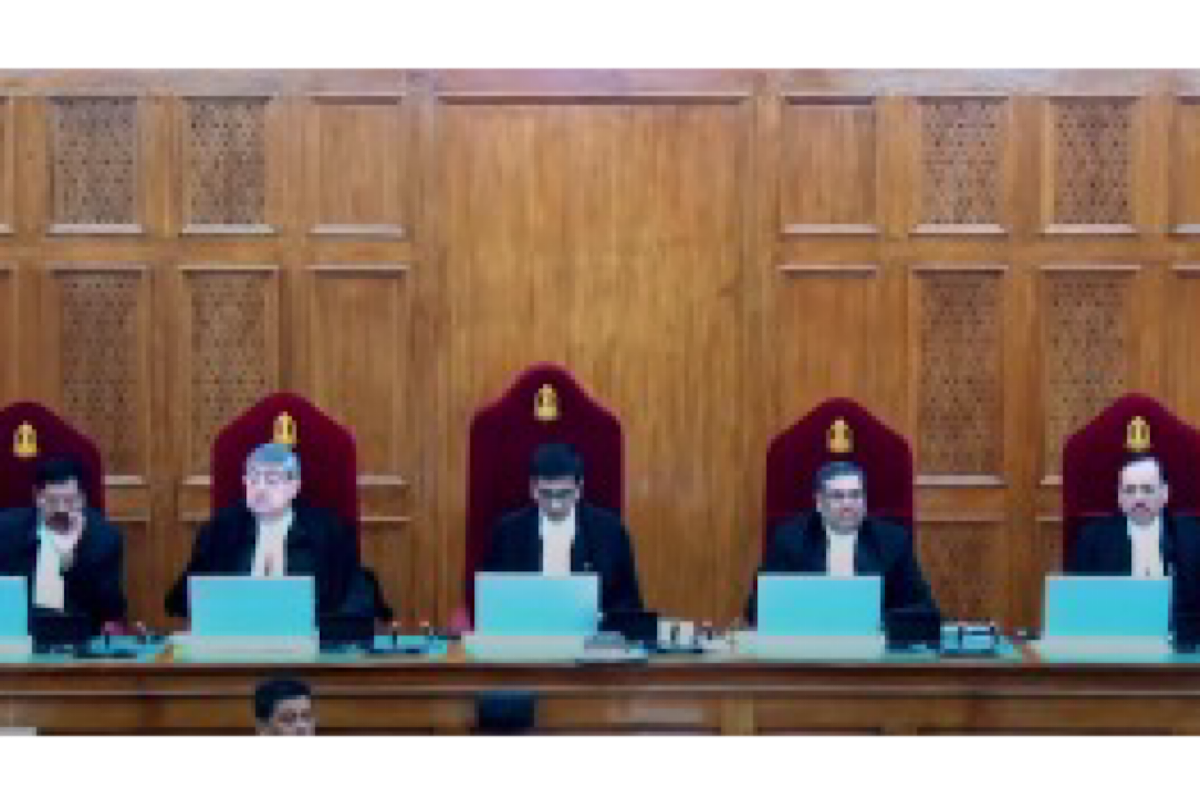The Supreme Court on Monday upheld the scrapping of Article 370 which accorded special status to erstwhile state of Jammu Kashmir, stating that it was a temporary provision and the extension of the Constitution in its entirety to the bifurcated Union Territory renders it “inoperative and redundant”.
Having upheld the abrogation of Article 370 and the carving out of the Union Territory of Ladakh, five-judge constitution bench comprising Chief Justice D.Y. Chandrachud, Justice Sanjay Kishan Kaul, Justice Sanjiv Khanna, Justice B. R. Gavai and Justice Surya Kant directed the Election Commission to hold the election to the J&K legislature by September 30, 2024.
The main judgment was authored by the Chief Justice Chandrachud also speaking for Justice Gavai and Justice Surya Kant, and Justice Kaul and Justice Khanna delivered concurring judgments with additional reasoning.
The court held that J&K did not retain any element of sovereignty after its accession to India.
Jammu and Kashmir does not retain any element of sovereignty after the execution of the Instrument of Accession and the issuance of the November 25, 1949 Proclamation by which the Constitution of India was adopted.
Rejecting the arguments by the petitioners that J&K after acceding its external sovereignty to the Union of India, retained internal sovereignty, the constitution bench ruled “The State of Jammu and Kashmir does not have ‘internal sovereignty’ which is distinguishable from the powers and privileges enjoyed by other States in the country. Article 370 was a feature of asymmetric federalism and not sovereignty.”
Upholding the carving out of Ladakh as Union Territory, the court did not dwell into the question whether the reorganisation of the State of Jammu and Kashmir into two Union Territories of Ladakh and Jammu and Kashmir is permissible under Article 3 of the constitution.
Not dwelling into the question of the permissibility of whether the reorganisation of the State and bifurcating it into two Union Territories, the constitution bench referred to a statement made by the solicitor General in the course of the argument in the case that Statehood would be restored to J&K.
“The Solicitor General stated that the statehood of Jammu and Kashmir will be restored (except for the carving out of the Union Territory of Ladakh). In view of the statement, we do not find it necessary to determine whether the reorganisation of the State of Jammu and Kashmir into two Union Territories of Ladakh and Jammu and Kashmir is permissible under Article 3. However, we uphold the validity of the decision to carve out the Union Territory of Ladakh in view of Article 3(a) read with Explanation I, which permits forming a Union Territory by separation of a territory from any State.”
Having said this the Supreme Court directed that the statehood be restored at the earliest as soon as possible and directed the poll panel to hold elections to J&K assembly by September 30, 2024.
“We direct that steps shall be taken by the Election Commission of India to conduct elections to the Legislative Assembly of Jammu and Kashmir constituted under Section 14 of the Reorganisation Act by 30 September 2024. Restoration of statehood shall take place at the earliest and as soon as possible”, the court said, directing the Election Commission and the central government.
The top court said this while answering eight questions that it framed to address all the issues that were raised and argued by the petitioners challenging the abrogation of Article 370 and the bifurcation of the State in two UTs before the constitution bench in the course of the hearing that was spread over 16 days. The verdict was reserved on September 5, 2023.
Answering the question whether irreversible steps can be taken – abrogation of Article 370 and the bifurcation of the state into two UTs – when there is no elected representative government in the J&K, Justice Kaul – in his separate judgment concurring with CJI Chandrachud’s judgments, said , “Once the Presidential proclamation has been approved by both Houses of Parliament, so as to reflect the will of the people, the President has the power under Article 356 to make irreversible changes, including the dissolution of the State Assembly.”
Justice Kaul further said, “…in the absence of the State Government and State Legislature, the power of these elected organs must lie with any other competent authority … and Article 356(1)(b) allows the Union Parliament to exercise all powers of the State Legislature without distinguishing between legislative and non-legislative powers of the State Legislature.”
Justice Khannas in a concurring judgment said, “Union Territories are normally geographically small territories, or may be created for aberrant reasons or causes. Conversion of a State into Union Territory has grave consequences, amongst others, it denies the citizens of the State an elected state government and impinges on federalism. Conversion/creation of a Union Territory from a State has to be justified by giving very strong and cogent grounds. It must be in strict compliance with Article 3 of the Constitution of India.”
Stating that the Kashmir valley carries a historical burden as victims of the conflict for several decades originating from 1947 with the invasion of the Valley, second round of insurgency originating in the latter part of 1980s, which culminated in the voluntary migration of Kashmiri Pandits, and the and the consequences of intergenerational trauma on an already fractured society, Justice Kaul recommended an expeditious setting up of a truth and reconciliation commission as a way forward.
Justice Kaul said that the Commission would investigate and report on the violation of human rights both by State and non-State actors perpetrated in Jammu & Kashmir at least since the 1980s and recommend measures for reconciliation.
Justice Kaul referred to the success of such a “Truth and Reconciliation Commission” in South Africa that was set up to investigate human rights violations perpetrated during the period of the Apartheid regime, which he said, “ served as a means of reckoning or catharsis for victims, and fostered peace-building.”












